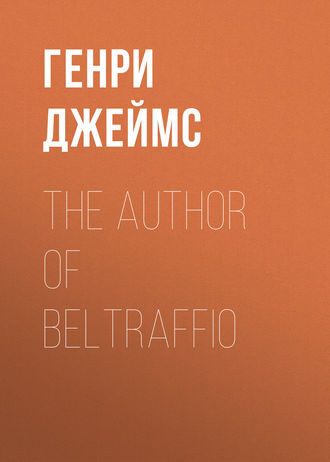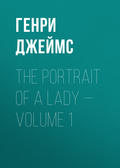
Генри Джеймс
The Author of Beltraffio
IV
I remained with Mrs. Ambient, but as a servant had brought out a couple of chairs I wasn’t obliged to seat myself beside her. Our conversation failed of ease, and I, for my part, felt there would be a shade of hypocrisy in my now trying to make myself agreeable to the partner of my friend’s existence. I didn’t dislike her—I rather admired her; but I was aware that I differed from her inexpressibly. Then I suspected, what I afterwards definitely knew and have already intimated, that the poor lady felt small taste for her husband’s so undisguised disciple; and this of course was not encouraging. She thought me an obtrusive and designing, even perhaps a depraved, young man whom a perverse Providence had dropped upon their quiet lawn to flatter his worst tendencies. She did me the honour to say to Miss Ambient, who repeated the speech, that she didn’t know when she had seen their companion take such a fancy to a visitor; and she measured apparently my evil influence by Mark’s appreciation of my society. I had a consciousness, not oppressive but quite sufficient, of all this; though I must say that if it chilled my flow of small-talk it yet didn’t prevent my thinking the beautiful mother and beautiful child, interlaced there against their background of roses, a picture such as I doubtless shouldn’t soon see again. I was free, I supposed, to go into the house and write letters, to sit in the drawing-room, to repair to my own apartment and take a nap; but the only use I made of my freedom was to linger still in my chair and say to myself that the light hand of Sir Joshua might have painted Mark Ambient’s wife and son. I found myself looking perpetually at the latter small mortal, who looked constantly back at me, and that was enough to detain me. With these vaguely-amused eyes he smiled, and I felt it an absolute impossibility to abandon a child with such an expression. His attention never strayed; it attached itself to my face as if among all the small incipient things of his nature throbbed a desire to say something to me. If I could have taken him on my own knee he perhaps would have managed to say it; but it would have been a critical matter to ask his mother to give him up, and it has remained a constant regret for me that on that strange Sunday afternoon I didn’t even for a moment hold Dolcino in my arms. He had said he felt remarkably well and was especially happy; but though peace may have been with him as he pillowed his charming head on his mother’s breast, dropping his little crimson silk legs from her lap, I somehow didn’t think security was. He made no attempt to walk about; he was content to swing his legs softly and strike one as languid and angelic.
Mark returned to us with his sister; and Miss Ambient, repeating her mention of the claims of her correspondence, passed into the house. Mark came and stood in front of his wife, looking down at the child, who immediately took hold of his hand and kept it while he stayed. “I think Mackintosh ought to see him,” he said; “I think I’ll walk over and fetch him.”
“That’s Gwendolen’s idea, I suppose,” Mrs. Ambient replied very sweetly.
“It’s not such an out-of-the-way idea when one’s child’s ill,” he returned.
“I’m not ill, papa; I’m much better now,” sounded in the boy’s silver pipe.
“Is that the truth, or are you only saying it to be agreeable? You’ve a great idea of being agreeable, you know.”
The child seemed to meditate on this distinction, this imputation, for a moment; then his exaggerated eyes, which had wandered, caught my own as I watched him. “Do you think me agreeable?” he inquired with the candour of his age and with a look that made his father turn round to me laughing and ask, without saying it, “Isn’t he adorable?”
“Then why don’t you hop about, if you feel so lusty?” Ambient went on while his son swung his hand.
“Because mamma’s holding me close!”
“Oh yes; I know how mamma holds you when I come near!” cried Mark with a grimace at his wife.
She turned her charming eyes up to him without deprecation or concession. “You can go for Mackintosh if you like. I think myself it would be better. You ought to drive.”
“She says that to get me away,” he put to me with a gaiety that I thought a little false; after which he started for the Doctor’s.
I remained there with Mrs. Ambient, though even our exchange of twaddle had run very thin. The boy’s little fixed white face seemed, as before, to plead with me to stay, and after a while it produced still another effect, a very curious one, which I shall find it difficult to express. Of course I expose myself to the charge of an attempt to justify by a strained logic after the fact a step which may have been on my part but the fruit of a native want of discretion; and indeed the traceable consequences of that perversity were too lamentable to leave me any desire to trifle with the question. All I can say is that I acted in perfect good faith and that Dolcino’s friendly little gaze gradually kindled the spark of my inspiration. What helped it to glow were the other influences—the silent suggestive garden-nook, the perfect opportunity (if it was not an opportunity for that it was an opportunity for nothing) and the plea I speak of, which issued from the child’s eyes and seemed to make him say: “The mother who bore me and who presses me here to her bosom—sympathetic little organism that I am—has really the kind of sensibility she has been represented to you as lacking, if you only look for it patiently and respectfully. How is it conceivable she shouldn’t have it? How is it possible that I should have so much of it—for I’m quite full of it, dear strange gentleman—if it weren’t also in some degree in her? I’m my great father’s child, but I’m also my beautiful mother’s, and I’m sorry for the difference between them!” So it shaped itself before me, the vision of reconciling Mrs. Ambient with her husband, of putting an end to their ugly difference. The project was absurd of course, for had I not had his word for it—spoken with all the bitterness of experience—that the gulf dividing them was well-nigh bottomless? Nevertheless, a quarter of an hour after Mark had left us, I observed to my hostess that I couldn’t get over what she had told me the night before about her thinking her husband’s compositions “objectionable.” I had been so very sorry to hear it, had thought of it constantly and wondered whether it mightn’t be possible to make her change her mind. She gave me a great cold stare, meant apparently as an admonition to me to mind my business. I wish I had taken this mute counsel, but I didn’t take it. I went on to remark that it seemed an immense pity so much that was interesting should be lost on her.
“Nothing’s lost upon me,” she said in a tone that didn’t make the contradiction less. “I know they’re very interesting.”
“Don’t you like papa’s books?” Dolcino asked, addressing his mother but still looking at me. Then he added to me: “Won’t you read them to me, American gentleman?”
“I’d rather tell you some stories of my own,” I said. “I know some that are awfully good.”
“When will you tell them? To-morrow?”
“To-morrow with pleasure, if that suits you.”
His mother took this in silence. Her husband, during our walk, had asked me to remain another day; my promise to her son was an implication that I had consented, and it wasn’t possible the news could please her. This ought doubtless to have made me more careful as to what I said next, but all I can plead is that it didn’t. I soon mentioned that just after leaving her the evening before, and after hearing her apply to her husband’s writings the epithet already quoted, I had on going up to my room sat down to the perusal of those sheets of his new book that he had been so good as to lend me. I had sat entranced till nearly three in the morning—I had read them twice over. “You say you haven’t looked at them. I think it’s such a pity you shouldn’t. Do let me beg you to take them up. They’re so very remarkable. I’m sure they’ll convert you. They place him in—really—such a dazzling light. All that’s best in him is there. I’ve no doubt it’s a great liberty, my saying all this; but pardon me, and do read them!”
“Do read them, mamma!” the boy again sweetly shrilled. “Do read them!”
She bent her head and closed his lips with a kiss. “Of course I know he has worked immensely over them,” she said; after which she made no remark, but attached her eyes thoughtfully to the ground. The tone of these last words was such as to leave me no spirit for further pressure, and after hinting at a fear that her husband mightn’t have caught the Doctor I got up and took a turn about the grounds. When I came back ten minutes later she was still in her place watching her boy, who had fallen asleep in her lap. As I drew near she put her finger to her lips and a short time afterwards rose, holding him; it being now best, she said, that she should take him upstairs. I offered to carry him and opened my arms for the purpose; but she thanked me and turned away with the child still in her embrace, his head on her shoulder. “I’m very strong,” was her last word as she passed into the house, her slim flexible figure bent backward with the filial weight. So I never laid a longing hand on Dolcino.
I betook myself to Ambient’s study, delighted to have a quiet hour to look over his books by myself. The windows were open to the garden; the sunny stillness, the mild light of the English summer, filled the room without quite chasing away the rich dusky tone that was a part of its charm and that abode in the serried shelves where old morocco exhaled the fragrance of curious learning, as well as in the brighter intervals where prints and medals and miniatures were suspended on a surface of faded stuff. The place had both colour and quiet; I thought it a perfect room for work and went so far as to say to myself that, if it were mine to sit and scribble in, there was no knowing but I might learn to write as well as the author of “Beltraffio.” This distinguished man still didn’t reappear, and I rummaged freely among his treasures. At last I took down a book that detained me a while and seated myself in a fine old leather chair by the window to turn it over. I had been occupied in this way for half an hour—a good part of the afternoon had waned—when I became conscious of another presence in the room and, looking up from my quarto, saw that Mrs. Ambient, having pushed open the door quite again in the same noiseless way marking or disguising her entrance the night before, had advanced across the threshold. On seeing me she stopped; she had not, I think, expected to find me. But her hesitation was only of a moment; she came straight to her husband’s writing-table as if she were looking for something. I got up and asked her if I could help her. She glanced about an instant and then put her hand upon a roll of papers which I recognised, as I had placed it on that spot at the early hour of my descent from my room.
“Is this the new book?” she asked, holding it up.
“The very sheets,” I smiled; “with precious annotations.”
“I mean to take your advice”—and she tucked the little bundle under her arm. I congratulated her cordially and ventured to make of my triumph, as I presumed to call it, a subject of pleasantry. But she was perfectly grave and turned away from me, as she had presented herself, without relaxing her rigour; after which I settled down to my quarto again with the reflexion that Mrs. Ambient was truly an eccentric. My triumph, too, suddenly seemed to me rather vain. A woman who couldn’t unbend at a moment exquisitely indicated would never understand Mark Ambient. He came back to us at last in person, having brought the Doctor with him. “He was away from home,” Mark said, “and I went after him to where he was supposed to be. He had left the place, and I followed him to two or three others, which accounts for my delay.” He was now with Mrs. Ambient, looking at the child, and was to see Mark again before leaving the house. My host noticed at the end of two minutes that the proof-sheets of his new book had been removed from the table; and when I told him, in reply to his question as to what I knew about them, that Mrs. Ambient had carried them off to read he turned almost pale with surprise. “What has suddenly made her so curious?” he cried; and I was obliged to tell him that I was at the bottom of the mystery. I had had it on my conscience to assure her that she really ought to know of what her husband was capable. “Of what I’m capable? Elle ne s’en doute que trop!” said Ambient with a laugh; but he took my meddling very good-naturedly and contented himself with adding that he was really much afraid she would burn up the sheets, his emendations and all, of which latter he had no duplicate. The Doctor paid a long visit in the nursery, and before he came down I retired to my own quarters, where I remained till dinner-time. On entering the drawing-room at this hour I found Miss Ambient in possession, as she had been the evening before.
“I was right about Dolcino,” she said, as soon as she saw me, with an air of triumph that struck me as the climax of perversity. “He’s really very ill.”
“Very ill! Why when I last saw him, at four o’clock, he was in fairly good form.”
“There has been a change for the worse, very sudden and rapid, and when the Doctor got here he found diphtheritic symptoms. He ought to have been called, as I knew, in the morning, and the child oughtn’t to have been brought into the garden.”
“My dear lady, he was very happy there,” I protested with horror.
“He would be very happy anywhere. I’ve no doubt he’s very happy now, with his poor little temperature—!” She dropped her voice as her brother came in, and Mark let us know that as a matter of course Mrs. Ambient wouldn’t appear. It was true the boy had developed diphtheritic symptoms, but he was quiet for the present and his mother earnestly watching him. She was a perfect nurse, Mark said, and Mackintosh would come back at ten. Our dinner wasn’t very gay—with my host worried and absent; and his sister annoyed me by her constant tacit assumption, conveyed in the very way she nibbled her bread and sipped her wine, of having “told me so.” I had had no disposition to deny anything she might have told me, and I couldn’t see that her satisfaction in being justified by the event relieved her little nephew’s condition. The truth is that, as the sequel was to prove, Miss Ambient had some of the qualities of the sibyl and had therefore perhaps a right to the sibylline contortions. Her brother was so preoccupied that I felt my presence an indiscretion and was sorry I had promised to remain over the morrow. I put it to Mark that clearly I had best leave them in the morning; to which he replied that, on the contrary, if he was to pass the next days in the fidgets my company would distract his attention. The fidgets had already begun for him, poor fellow; and as we sat in his study with our cigars after dinner he wandered to the door whenever he heard the sound of the Doctor’s wheels. Miss Ambient, who shared this apartment with us, gave me at such moments significant glances; she had before rejoining us gone upstairs to ask about the child. His mother and his nurse gave a fair report, but Miss Ambient found his fever high and his symptoms very grave. The Doctor came at ten o’clock, and I went to bed after hearing from Mark that he saw no present cause for alarm. He had made every provision for the night and was to return early in the morning.
I quitted my room as eight struck the next day and when I came downstairs saw, through the open door of the house, Mrs. Ambient standing at the front gate of the grounds in colloquy with Mackintosh. She wore a white dressing-gown, but her shining hair was carefully tucked away in its net, and in the morning freshness, after a night of watching, she looked as much “the type of the lady” as her sister-in-law had described her. Her appearance, I suppose, ought to have reassured me; but I was still nervous and uneasy, so that I shrank from meeting her with the necessary challenge. None the less, however, was I impatient to learn how the new day found him; and as Mrs. Ambient hadn’t seen me I passed into the grounds by a roundabout way and, stopping at a further gate, hailed the Doctor just as he was driving off. Mrs. Ambient had returned to the house before he got into his cart.
“Pardon me, but as a friend of the family I should like very much to hear about the little boy.”
The stout sharp circumspect man looked at me from head to foot and then said: “I’m sorry to say I haven’t seen him.”
“Haven’t seen him?”
“Mrs. Ambient came down to meet me as I alighted, and told me he was sleeping so soundly, after a restless night, that she didn’t wish him disturbed. I assured her I wouldn’t disturb him, but she said he was quite safe now and she could look after him herself.”
“Thank you very much. Are you coming back?”
“No, sir; I’ll be hanged if I come back!” cried the honest practitioner in high resentment. And the horse started as he settled beside his man.
I wandered back into the garden, and five minutes later Miss Ambient came forth from the house to greet me. She explained that breakfast wouldn’t be served for some time and that she desired a moment herself with the Doctor. I let her know that the good vexed man had come and departed, and I repeated to her what he had told me about his dismissal. This made Miss Ambient very serious, very serious indeed, and she sank into a bench, with dilated eyes, hugging her elbows with crossed arms. She indulged in many strange signs, she confessed herself immensely distressed, and she finally told me what her own last news of her nephew had been. She had sat up very late—after me, after Mark—and before going to bed had knocked at the door of the child’s room, opened to her by the nurse. This good woman had admitted her and she had found him quiet, but flushed and “unnatural,” with his mother sitting by his bed. “She held his hand in one of hers,” said Miss Ambient, “and in the other—what do you think?—the proof-sheets of Mark’s new book!” She was reading them there intently: “did you ever hear of anything so extraordinary? Such a very odd time to be reading an author whom she never could abide!” In her agitation Miss Ambient was guilty of this vulgarism of speech, and I was so impressed by her narrative that only in recalling her words later did I notice the lapse. Mrs. Ambient had looked up from her reading with her finger on her lips—I recognised the gesture she had addressed me in the afternoon—and, though the nurse was about to go to rest, had not encouraged her sister-in-law to relieve her of any part of her vigil. But certainly at that time the boy’s state was far from reassuring—his poor little breathing so painful; and what change could have taken place in him in those few hours that would justify Beatrice in denying Mackintosh access? This was the moral of Miss Ambient’s anecdote, the moral for herself at least. The moral for me, rather, was that it was a very singular time for Mrs. Ambient to be going into a novelist she had never appreciated and who had simply happened to be recommended to her by a young American she disliked. I thought of her sitting there in the sick-chamber in the still hours of the night and after the nurse had left her, turning and turning those pages of genius and wrestling with their magical influence.







